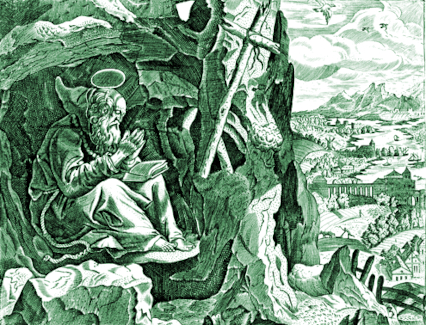Lives of the Saints
Our Models and Protectors
Spiritual Bouquet:
March 27

Saint John of Egypt
Solitary
(† 394)
Until he was twenty-five, John worked as a carpenter with his father. Then, experiencing a call from God, he left the world and committed himself to a holy solitary in the desert. His master tested him by many unreasonable commands, bidding him roll hard rocks, tend dead trees, and the like. John distinguished himself by his perfect obedience, for he executed all commands with the simplicity of a child.
The monk Palladius, who later became a bishop, visited him one day. Saint John foretold he would some day become a bishop. He laughed, saying he was only in charge of a kitchen, but Saint John smiled and said, You will have, in that future office, many labors and afflictions to endure. If you want to avoid them, remain in your solitude, for as long as you stay there, no one can consecrate you a bishop! Palladius, when he fell ill, was sent to Alexandria, then advised to go for his health to Palestine and Bithynia, in northeastern Asia Minor, where he was indeed made Bishop of Helenopolis. He was included in the persecution against Saint John Chrysostom, Patriarch of Constantinople, and had to conceal himself for eleven months in a dark room; there he recalled the words of the great prophet and spiritual teacher, Saint John of Egypt.
After a careful training of sixteen years, Saint John had withdrawn to the top of a steep cliff, to think only of God and his soul. The more he knew of himself, the more he distrusted himself. The result of his vigilance and purity was threefold — a holy joy and cheerfulness which consoled all who conversed with him, perfect obedience to superiors, and, in return for this, authority over creatures, whom he had forsaken for the Creator. He had the gift of reading in souls; once when a deacon visited him with six other persons, Saint John recognized him as a cleric, though the young man had kept it a secret until then, and denied it. Saint John kissed his hand after identifying him as a deacon before all present, saying, One must never lie, even under the pretext of doing good. Beware of disavowing the grace God has given you; for falsehood comes not from God, but from an evil source, as Our Saviour teaches us.
Devils assailed Saint John continually, but he never ceased his prayer. After his long communing with God, he turned to humans with gifts of healing and prophecy. Twice each week he spoke through a window with those who came to him, blessing oil for the sick and predicting things to come. To the Emperor Theodosius he foretold his future victories and the time of his death. Rufinus, biographer of the Desert Fathers, recorded a long instruction offered himself and other visitors from Jerusalem. Saint John warned in particular against vanity: Vanity is such a great and dangerous sin that it can make souls fall from the very heights of perfection; and that is why I exhort you to avoid it more than any other.
The last three days of his life he gave wholly to God; on the third he was found on his knees as in prayer, but his soul was with the blessed. He died in 394.
Reflection. The Saints examine themselves by the perfections of God, and do penance. We judge our conduct by the standard of other men, and rest satisfied with it. Yet it is by the divine graces we ourselves have received and either profited from or repulsed, that we shall be judged when we die.
Lives of the Desert Fathers: Their Spiritual Doctrine and Monastic Discipline, by Fr. Michel-Ange Marin (Editions Magnificat: St. Jovite, 1991); Little Pictorial Lives of the Saints, a compilation based on Butler's Lives of the Saints and other sources by John Gilmary Shea (Benziger Brothers: New York, 1894).